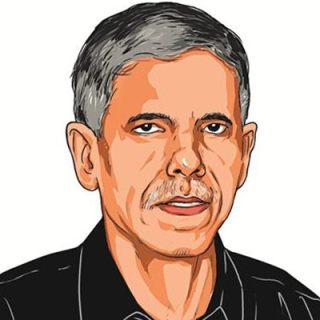Why MCQ isn’t an option
Multiple Choice Question format forces rigid standardisation, creates illusion that knowledge can be objective.

The growing legitimisation of the MCQ (Multiple Choice Question) pattern of exams for all sorts of entrance tests, particularly in the field of liberal arts and social sciences, indicates the poverty of pedagogic imagination that seems to have inflicted a team of techno-managers and academic bureaucrats. Even though all sorts of justifications — ranging from technological convenience, and instant process of selection and elimination, to “value-neutral” evaluation free from human subjectivities — are put forward in its defence; and, even though universities like JNU and DU fail to resist the temptations of these arguments, the fact is that it causes great damage to what really matters in humanities and social sciences: Reflexivity, creativity and an interpretative art of understanding.
To begin with, it is important to reflect on the common mistake that academic bureaucrats — often guided by some sort of “engineering” mindset — make. First, they think that all disciplines, be it English literature or mathematics, can be seen on the same scale. This love for mindless standardisation makes them think that even sociology or philosophy can be reduced into a set of “objective” postulates, or “puzzles” with only one “correct” answer. Second, they tend to see knowledge as the acquisition of mere “facts” (or, to put it more bluntly, “quiz contest” material — who said what, who invented what, and who wrote what), free from “ideological” aberrations or “subjective” prejudices. And third, with the hallucination of “mathematical precision”, they feel that creative articulation is dangerous or equivalent to madness because everything has to be fitted into the standardised/dominant formula or theorem. Hence, to take an illustration, Marx cannot be seen beyond “historical materialism” and “economic determinism”; or, for that matter, even Munshi Premchand’s Godan has to be reduced to a set of “objective” bullet points.
It is in this context that I wish to argue that we must abandon the idea of “objectivity” in humanities and social sciences (possibly, except mathematical economics, demography or areas filled with quantitative techniques). Well, there are solid facts — say, Max Weber wrote The Protestant Ethic and the Spirit of Capitalism, Michel Foucault reflected on Bentham’s Panopticon in his Discipline and Punish, Rabindranath Tagore portrayed the character of Anandamayee in his novel Gora, and Mohandas Karamchand Gandhi moved around Noakhali in 1946 to combat communal violence. But then, understanding sociology, literature or history doesn’t mean merely memorising and repeating these facts like a parrot. What really matters is to go deeper, and interpret the arguments and philosophic propositions these authors developed in their works. This means the willingness to accept that there is no singular truth, and there are many readings of the same text. For instance, two young students can come forward with two different interpretations of Gandhi’s Hind Swaraj: Gandhi, a revolutionary who could see the discontents of a civilisation based on the manufactured “needs” and resultant greed; and Gandhi, a conservative priest refusing to come to terms with the inevitability of historical progress. No, it is not like 2+2+=4; there is no “correct answer”; there are only multiple possibilities subject to a culture of debate. What is, therefore, important, is the rigour/sincerity/creativity in the art of interpretation. To deny it is to kill the soul of liberal arts and social sciences.
We have already done severe damage to the culture of learning. The fetish of 99 per cent marks in the board exams is killing the creative faculty of schoolchildren. With rote learning, they have mastered the technique of reducing everything into a set of bullet points depending on the marks allotted to a question. And then, coaching centres, guide books and all sorts of success mantras have killed even the slightest trace of joy and experimentation in the experience of learning. No wonder, we produce technologists — politically illiterate and culturally impoverished. The exams, like the National Eligibility Test and the UPSC Prelims, have further trivialised higher education. Sociology or history, it seems, has been imprisoned. It is sad to see a young aspirant — tired and disenchanted, only trying to recall “facts” like the date of the Gandhi-Irwin Pact, or the year of publication of Professor Andre Beteille’s Caste, Class and Power. And now, as teachers, we too have lost our agency. Even for selecting M.Phil/Ph.D candidates we have been asked to rely on the MCQ pattern of entrance test.
Hence, as teachers we are not supposed to think or evolve our unique modes of selection and evaluation. We will only formulate “objective” questions, and specialise ourselves in generating an MCQ bank. And we would be asked to believe that it is a good thing because we are now free from the task of evaluating entrance test copies with all sorts of “subjective” answers. The computer is the best judge as it has no “politics”.
Eventually, we would further deteriorate the status of the liberal arts and social sciences. We would destroy thinking and creative imagination. We would manufacture one-dimensional consciousness — a mind incapable of living with plurality, ambiguities and unresolved paradoxes. Is it what the system needs? Is it a conspiracy against emancipatory education? After all, our obsessive craze for objectivity, “certainty” and “homogeneity” would orient us to consume the products of the culture industry and feel “happy”, to accept the monologue of the authoritarian regime as the ultimate truth, and see ourselves as just loyal employees of gigantic corporations.







































No hay comentarios:
Publicar un comentario